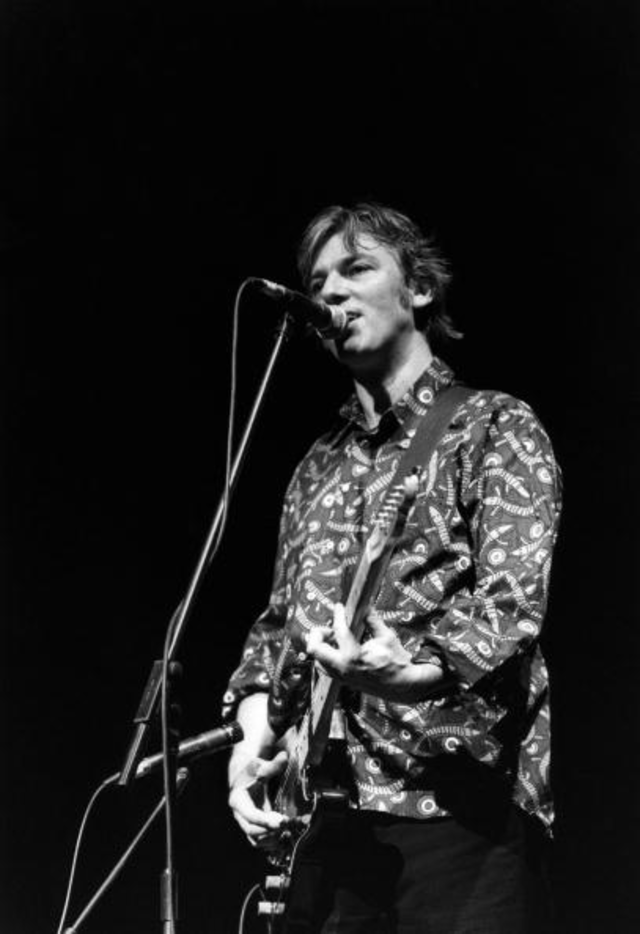Robyn Hitchcock: The Warner Brothers Years

Had Robyn Hitchcock not graced the world with his presence 61 years ago today, it’s highly probable we’d all currently be living an existence bereft of songs about iron sledges, midnight fishes, and furry green atom bowls, never having known the joy of hearing about men with lightbulb heads or Raymond Chandler evenings…and in case you’re not familiar with the gentleman’s work, trust us when we tell you that this would be a very miserable life for anyone to lead.
Oh, wait: if you’re not familiar with him, then that means it’s the life you’re currently leading, isn’t it? Yikes. Sorry for the abrupt reality check, but if you stick around for a bit, we’ll be able to remedy that problem for you and possible fill a void in your life that you never realized needed to be filled.
To celebrate the day of Mr. Hitchcock’s birth, we’re going to shine a spotlight on his brief tenure as a Warner Brothers recording artist, but we’ll start out by underlining one very important bit: the fact that his stint on the label was brief should in no way be taken to mean that the material he recorded during his time there made for anything less than enjoyable listening. To our way of thinking, it was simply a case of Hitchcock returning to the world of music in 1996 after taking a bit of time off, only to find listeners busy doing the Macarena, slow jamming to the Fugees’ “Killing Her Softly,” and holding their lighters aloft for Oasis’ “Wonderwall.” Oh, well, that’s the music biz for you.
Moss Elixir (1996): When Hitchcock returned from the musical wilderness, as it were, it was without his trusty backing band the Egyptians in tow.Well, actually, one Egyptian stuck around to chime in a bit – Morris Windsor, who’d worked with Hitchcock since the two of them were Soft Boys together –but the formal credit for the album went strictly to Hitchcock. While Moss Elixir didn’t entirely eschew the pop sensibilities of past songs like “Balloon Man” or “So You Think You’re in Love” (just listen to “Alright, Yeah” for instant proof), there was certainly one major change to Hitchcock’s sound, courtesy of the arrival of violinist Deni Bonet, whose introduction into the fold was evident from the very first track, “Sinister But She Was Happy.” At times echoing albums like I Often Dream of Trains and Eye with its emphasis on acoustic over electric, Moss Elixir may not have been the breakout hit that Warner Brothers might’ve hoped for when they signed Hitchcock, but it certainly served to confirm to his fans that he was back in business and fully prepared to make great music again.
Mossy Liquor: Outtakes and Prototypes (1996): Speaking of Hitchcock’s fans, this one’s strictly for them…well, you know, unless you think a collection of rarities and demos that kicks off with a Swedish version of “Alright, Yeah” is likely to excite the masses. Originally a vinyl-only release, Mossy Liquor reveals much more of the eccentricities that had always kept Hitchcock on the fringes of success rather than at the top of the charts, but that’s okay: it was never intended to be much more than a gift to the diehards, anyway, and they ate it up.
Storefront Hitchcock: Music from the Jonathan Demme Motion Picture (1998): The idea of teaming one of the great underrated British songwriters of his era with the man responsible for one of the greatest concert films of all time (Talking Heads’ Stop Making Sense) seemed like something that could only end in wonderfulness…and that’s exactly what it did, thankfully. What it did not do, however, was substantially raise Robyn Hitchcock’s profile beyond that of the cult singer he’d always been. Oh, well, you can’t win ‘em all. At least a pretty fab performance came out of the collaboration, including the debut of an instant classic (“1974”), acoustic revisitings of several old favorites (among them “I’m Only You,” “The Yip Song,” and “Glass Hotel”), and a pretty swell Jimi Hendrix cover (“The Wind Cries Mary”), all of it interspersed with the bizarre mutterings which are de rigueur for any Robyn Hitchcock show.
Jewels for Sophia (1999): It’s ironic that Hitchcock’s final studio album for Warner Brothers was filled with guest appearances by numerous individuals that the label could’ve used to help promote it to a wider audience, including recurring collaborator Peter Buck (R.E.M.), members of Young Fresh Fellows, Jon Brion, Grant-Lee Phillips, and Hitchcock’s first collaboration with Kimberley Rew, his fellow former Soft Boy (not to mention the man who wrote Katrina and the Waves’ “Walking on Sunshine”), in many, many moons. In the label’s defense, however, it probably would’ve been hard to sell radio stations on songs called “Mexican God,” “The Cheese Alarm,” “NASA Clapping,” and “Antwoman” no matter who’d played on the record. There’s some great stuff here, though, with highlights including the rollicking “Elizabeth Jade,” the poignant “No, I Don’t Remember Guilford,” and the folky fun of “You’ve Got a Sweet Mouth on You, Baby.”
(It’s also worth mentioning that, as he’d done with the preceding studio album, Hitchcock also offered an alternate look into the sessions for Jewels for Sophia, releasing a 12-track companion piece called A Star for Bram. Unfortunately, as he issued it via his own label, it doesn’t qualify for a full discussion within this particular piece, but suffice it to say that fans will enjoy it as much as anything else he’s put out over the years.)
So that’s it for Robyn Hitchcock on Warner Brothers, then. It wasn’t a lengthy stay, but for his fans, it was still a fulfilling one. You can check out the whole shebang on the Spotify playlist we’ve constructed for you. If you like what you hear, why not drop him a line on Twitter and tell him so? Oh, and be sure to wish him a happy birthday, too!


